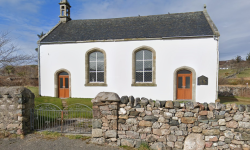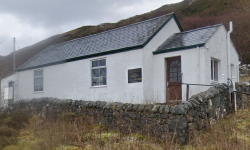From the Free Presbyterian Magazine, Feb. 1910, Vol 14(10): 388-390.
The late Mr William Morrison,
Kinlochbervie, Sutherlandshire.
THE subject of this notice was born at Achrisakill, a township on the north side of Loch Inchard, on the west coast of Sutherlandshire, in the year 1828. His father, Robert Morrison, or Rob MacEoin, as he was generally called, removed to Foindle, a small township on the south side of Loch Laxford, when William was about three years of age. Rob MacEoin was a man who feared the Lord, and ruled his house well, as we are informed.
William, thus having the high privilege of early training in the admonition of the Lord, to reverence His Lord and honour His law, was enabled to carry it with him to the end of his days, and was often grieved when he would see others slighting God’s law, such as herding cattle on the Lord’s Day, and other unnecessary works, which are getting far too common in our day in our once Sabbath-honouring Highlands. The impression made on William’s mind in early life by pious men and women was evident from the delight he took in speaking and relating anecdotes about them as his journey here was drawing near the end. We are sorry we cannot give much of his personal experience, as he seemed reserved on that point, but he showed himself a witness for the truth and a wrestler at a throne of grace.
William was about fifteen years of age at the time of the Disruption in 1843, and remembered it well. Having a Fair measure of education, and endowed with a wide understanding, he kept himself closely in touch with the proceedings of the Free Church, and bemoaned her backslidings. In the year 1871 William removed from Foindle to Kinlochbervie, bringing his father and mother with him in their old age, and he availed himself of the privilege of attending Communions not only in the neighbouring parishes, but also at Lairg and Creich in the days of Dr. Kennedy and Dr. Aird, and other witnesses who believed that want of conformity to God’s law is sin as surely as the positive breach thereof, and did not fail to warn their hearers of the inexpressible danger of departing from the rule of God’s Word.
So when the Free Church broke her constitution by passing the Declaratory Act of 1892, William was the first in his congregation to sever his connection with that Church. Seeing he could no longer conscientiously support that Church, he lost no time in sending his own mite, and that of such as he found like-minded, to the support of those who were honoured in abiding by the standard of truth. It was largely through his influence, along with the late John M’Leod, Badcall, Inchard, of whom mention was made in these pages (Vol. viii., No. 8, page 268), and the late Donald M’Leod, Inshegra, who predeceased both, that a public testimony was raised in Kinlochbervie in connection with the Free Presbyterian Church, being encouraged in word and action by the late William Sutherland, catechist, Lochinver, who was chiefly instrumental in raising the testimony in Scourie. These three men wrought unweariedly in bringing ministers to the parish to enlighten the people on the falsity of the Declaratory Act, and the necessity of raising a testimony for the truth, sometimes bringing them in their own conveyances from Lochinver-a distance of forty-seven miles.
At first the schools and the Established Church were open for them to gather in at such times, but in 1899 the School Board of Eddrachillis, which was mostly composed of ministers, thought it a fit time to close the schools against all religious meetings except at Communion seasons, while they were left open for concerts and dances. Such actions will contribute largely to show the stamp of men’s characters. Soon after the Established Church was also closed against them. The only recourse now was to meet in William Morrison’s house, and this, being large and commodious, was able to accommodate a large number of people. Instead of this emergency doing harm to the Free Presbyterian Church, it only pushed them forward in getting a meeting-house of their own built. They had much trouble in obtaining a site, it being refused on the common grazing, until latterly it was obtained on a croft. Some willing hearts and hands going about the work, the meeting-house was formally opened in July, 1902. A missionary was placed over the congregation, Scourie combined, and although some have proved themselves “unstable as water,” the congregation is still pulling through.
In October, 1902, the subject of our sketch was ordained an elder, with others in the congregation, at the time of the first Free Presbyterian Communion held in Kinlochbervie. He acted as treasurer to the congregation since early in 1903, until, owing to the frailty of old age, he was relieved of the work by his son. He also led the exercises of the congregation on the Sabbath in the absence of the missionary.
As was stated already, owing to his reserve, we cannot give much of his spiritual experience. On one occasion, while speaking to “the question” at a Friday fellowship meeting, he gave as a mark of the Lord’s people, that they would be sometimes afraid that they hadn’t the right faith, and that they might be that way until they would see it on the other side of time. He said to a friend after a Communion season: “I was hoping that I would have been converted at the Communion, but I am as I was before it.” On another occasion he said to the same friend, apparently having been in very deep waters for days: “I was often angry at Peter for denying his Master, but it is one of the sweetest passages of Scripture for me to-day.” He was a frequent wrestler at the throne of grace, pleading for himself and others. He was unable to attend the public means of grace since March, 1908, but was, in general, able to take part at the family altar, late and early, till very near the end. On being asked by a friend, a few days before he died, how he was, he said, “I have much reason for thankfulness that, though weak, I have no pain.” The friend remarked, “There are some who cannot find fault with the Lord’s doings, whatever He will do to them,” and he replied, with deep emotion, “I believe that.” The last few days he did not speak much-the nature of his trouble was paralysis-but he showed signs of consciousness to the last. He was called away, we believe, to his eternal rest on the 4th September last, at the ripe age of eighty-one years.
Our very sincere sympathy is offered to his widow and all the members of his family, whether at home or abroad. May the Lord speedily raise the children in the place of the fathers!
D.M.

